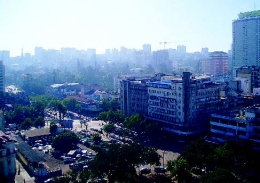A marriage of prosperity and poverty
MOZAMBIQUE’S life ex-pectancy, infant mortality and Human Development Index ratings are among the world’s worst. But surprisingly, its economy is one of the fastest growing.
Just a sideways glance reveals the many stark paradoxes. For example, the World Bank in 2007 referred to Mozambique’s “blistering pace” of economic growth – a fact it paralleled with rising child malnutrition in the country.
A political settlement in 1992 following a protracted civil war was the platform for Mozambique’s rapid growth, which included attracting foreign investment following privatisation of various sectors. The country has become particularly popular with foreign companies interested in exploiting mineral and energy resources on the continent.
But the economy still heavily relies on foreign donor assistance, and remains highly vulnerable to floods, droughts and other climatic attacks.
Another problem is HIV/ Aids. The country’s Prime Minister Luisa Diogo recently commented: “The impact of HIV/Aids on the economy is very big… productivity and production is affected. It’s difficult to replace someone who is infected given our scarce human resources, particularly in the public service.
“The figures are really alarming because we have 19 per cent of people infected with Aids. We are losing 1,600 of them every year and the government is now designing a strategy to have specific measures on how to deal with the pandemic.”
The economic crisis, too, is having an impact. Economic growth will slow to between four and six per cent this year, Diogo has said.
“Mozambique is used to having [figures like] 10 per cent, eight per cent or nine per cent, but comparing with the situation in the region… [to] have between four and six per cent, I believe that will be good.”
The country’s finance minister Manuel Chang has pointed to agriculture and tourism as possible booster industries, and has cited a more optimistic growth target of above six per cent.
“Agriculture, which contributes 24 per cent to the GDP, is a key sector of growth, and it depends on us,” he says. “We have in the sector an action plan to produce more cereals like rice and maize. By looking at sectors like tourism, energy and infrastructure development, we think that it is possible to achieve our 6.3 per cent target growth or more this year.”
But the paradoxes continue. While the government is targeting agriculture production as a way of enhancing the economy, a recent study found that hundreds of thousands are dependent on state food handouts.
According to a report released in March by the state-controlled food and nutritional security agency, some 450,000 people were facing food shortages throughout the country and were dependant on the food handouts co-ordinated by Mozambique’s agriculture ministry and the National Disaster Management Institute.












